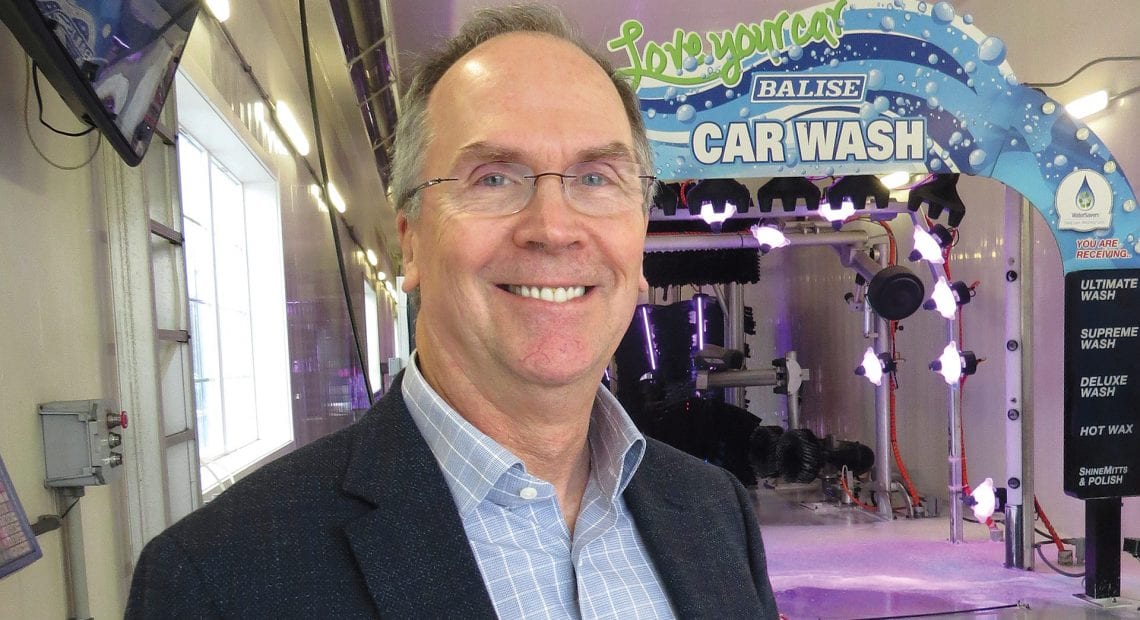
Balise Motor Sales Celebrates 100 Years of Seizing Opportunities
Century Unlimited
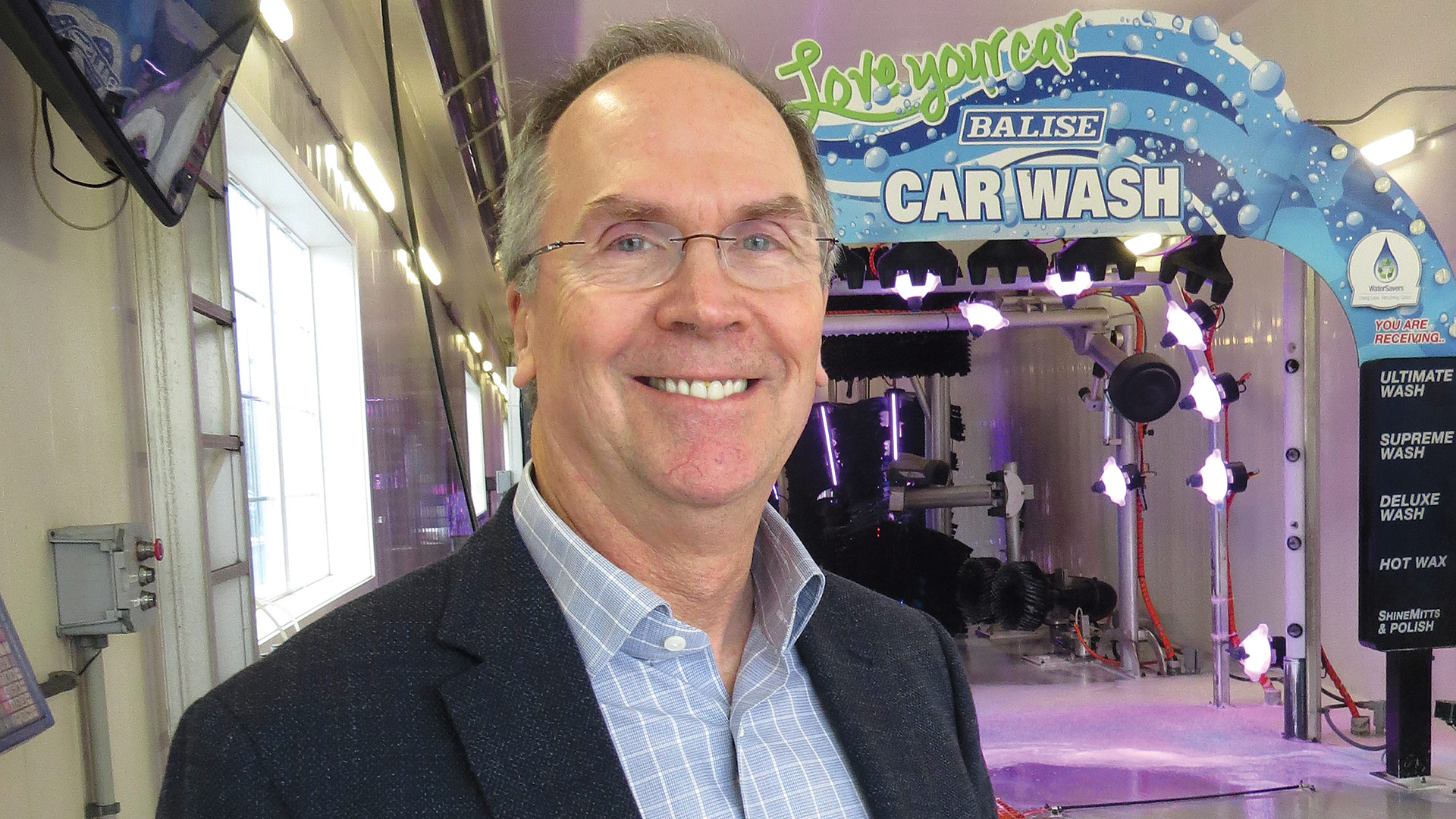
Jeb Balise stands in one of the company’s car washes, this one on Riverdale Street.
Some time in 1919 — when, exactly, no one really knows — Paul Balise went into business for himself repairing automobiles and selling them on the side. Today, that company he founded is one of the largest auto-dealer groups in New England and one of the 50 largest in the country. But in most all ways, it’s still doing business the same as it was when Woodrow Wilson was in the White House.
As he flipped through the large photo albums he helped assemble, Bobby Balise moved slowly and methodically, stopping at each page, and sometimes each image, to offer a little commentary.
That’s because every item in the collection helps tell a story that’s now 100 years in the making.
There’s the picture of the small repair garage in Hatfield where it all began. There are photos of the family’s farm and some of the animals raised there. Moving ahead a few pages, there’s a sales receipt from 1936 for a three-year-old Chevrolet Town Sedan sold to a William Bolack, sticker price $410 ($50 was given for a 1929 Ford that was traded in). Little did he know the transaction would become a piece of family history.
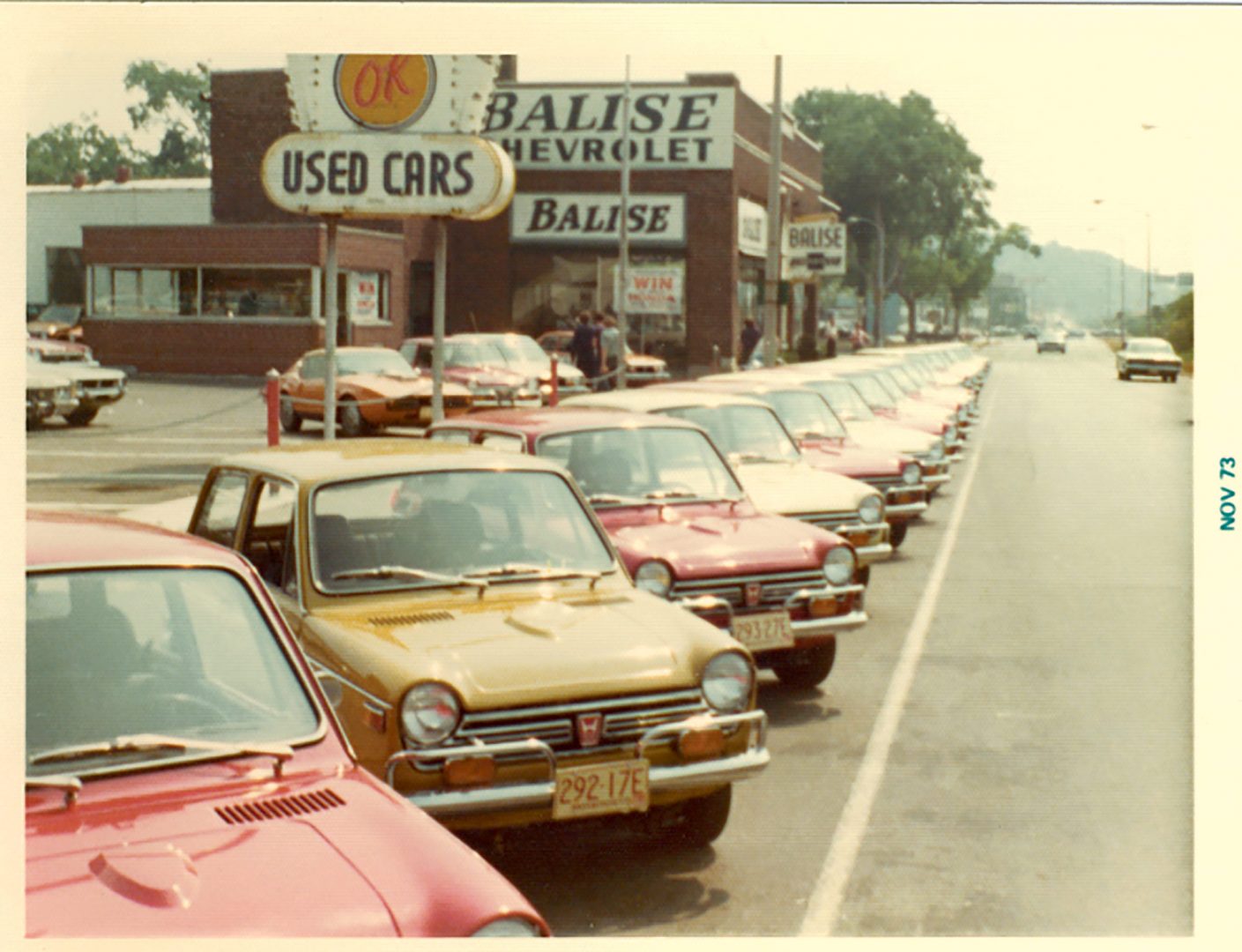
Honda models mingle with Chevys in the early 1970s.
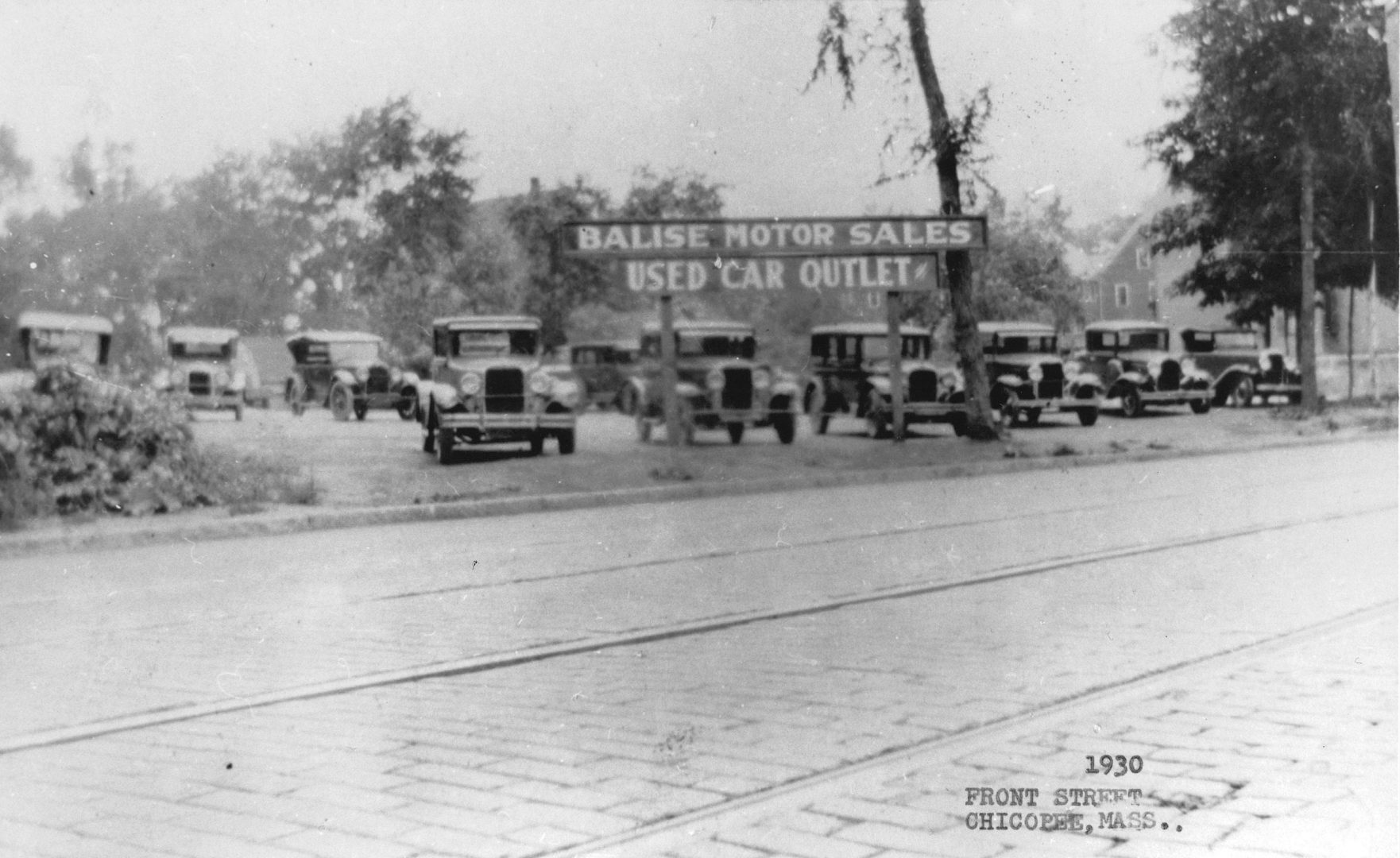
Paul Balise’s used car business on Front Street in Chicopee
Flipping a few more times, Balise came to a grainy copy of a newspaper photograph, an aerial shot showing the Chevrolet dealership on Columbus Avenue, the York Street Jail across the road, and other buildings in Springfield’s South End — including dozens of homes that would be torn down years later to make way for I-91 — standing in more than three feet of water after the hurricane of 1938.
And then, a few more pages in, there’s a photo montage of that day in 1954 when the Budweiser donkeys came to Springfield. That’s right, donkeys. Apparently they were used in addition to the famous Clydesdales to pull the wagon used in promotions for the beer maker. There’s a photo of the team passing that same dealership on Columbus Avenue and then another of them in the showroom. Balise explains:
“They were going to tour the South End of Springfield and the restaurants down there and entice people to buy more Budweiser. The story goes that they were supposed to stay at the stables across the street where the town had the horses for the garbage collectors. But something fell apart, there wasn’t enough room, the horses didn’t get along with donkeys, I don’t know what, but my Uncle Paul said they could house them in his showroom.”
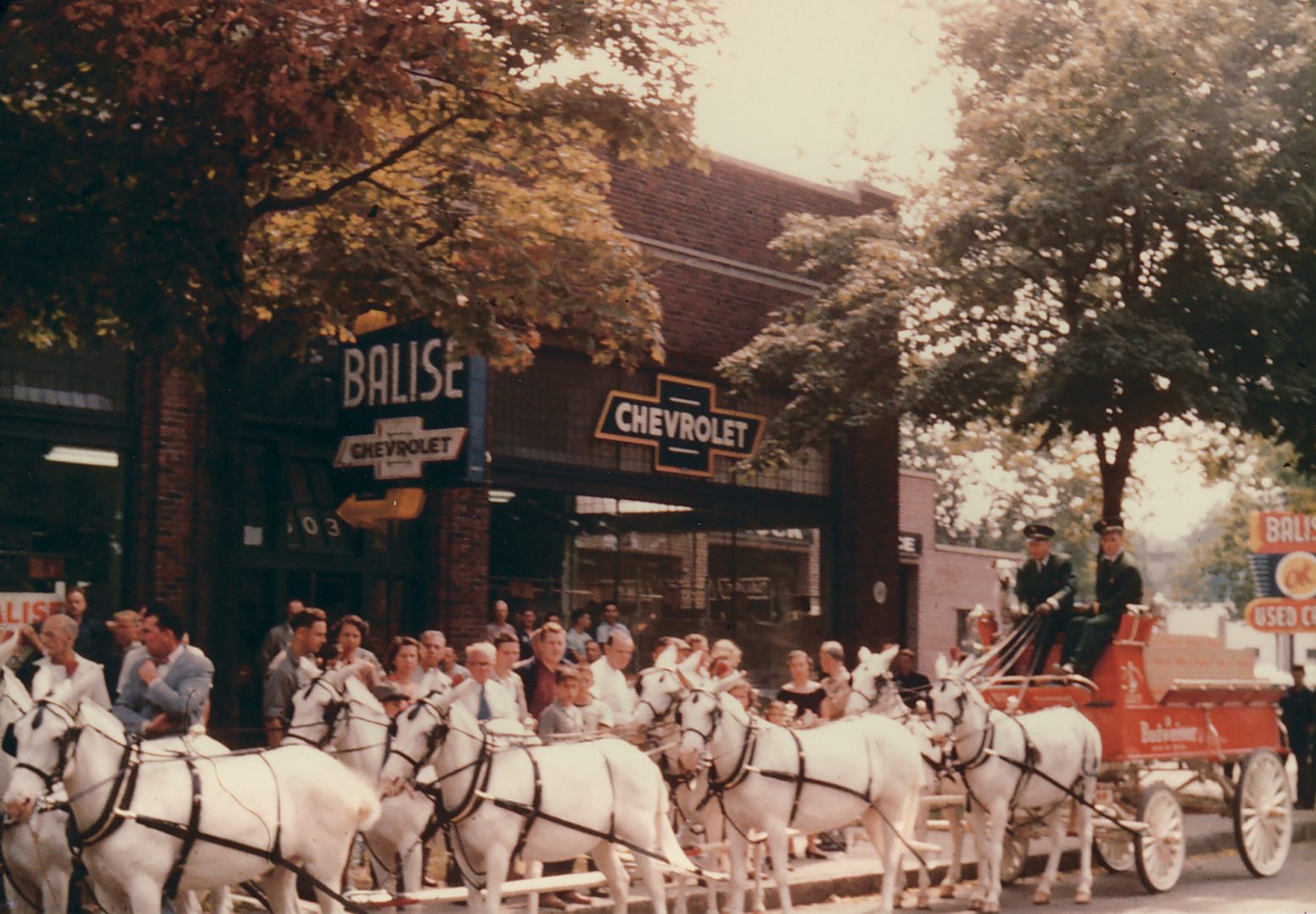
The Budweiser mules came to Springfield in 1954 and bedded down for a night at Balise Chevrolet, one of the more intriguing pages from the company’s long history.
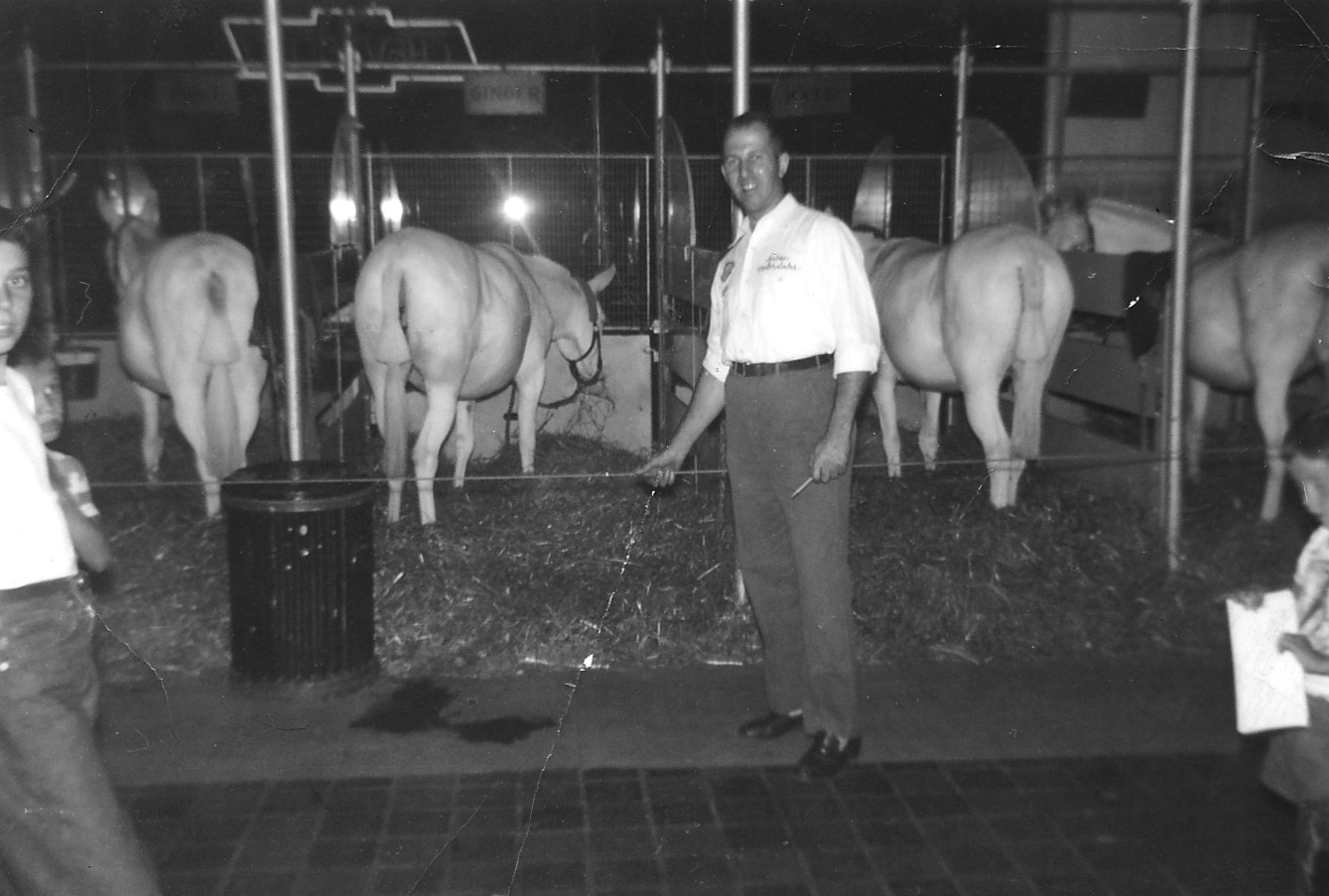
‘Uncle Paul’ is Paul Balise, founder of the company now known as Balise Motor Sales. He grew up on a farm, as noted earlier, but gravitated toward repairing and selling farm equipment, and then, as they became more popular, automobiles, said Bobby, whose business card reads ‘parts inventory manager’ for Balise Honda, but whose unofficial title is company historian, a role he relishes, to put things mildly.
Paul Balise started with an auto-repair business called the Square Deal Garage and sold cars on the side, his nephew went on. Later, he established a used-car business on Front Street in Chicopee and would eventually become a Chevrolet franchise dealer. He moved to Main Street in Springfield before talking a big leap and leasing — and then buying — the lot on Columbus Avenue that Balise Hyundai still stands on today (much more on all this later).
He was succeeded by his son, Jim, and then his grandson, Jeb, as president and dealer, and over the past few decades, Balise has grown to be the largest dealer group in this region, one of the largest in New England, and among the 50 largest in the country.
Summing up the first 100 years quickly and succinctly, Jeb Balise said that, starting with the garage in Hatfield and continuing with his grandfather’s risky decision to buy the Williams Dodge property on Columbus Avenue, his father’s gambit to sell a little-known Japanese car called Honda at the Chevy dealership, and carrying on today with Balise car washes and a host of auto-related businesses, the company has seized opportunities when and where it could with an eye toward staying on the cutting edge of an always-changing business.
“Starting with my grandfather, we’ve been entrepreneurial and always looking for better ways to serve the customer,” he said, adding that it has been this way since 1919.
When, exactly, in 1919 no one really knows, said Bobby Balise, adding that the company that has become one of the most recognizable brands in this region had a rather informal beginning.
And there are some other dates and miscellaneous bits of information that remain question marks, such as the precise location of that dealership in Chicopee.
But a great deal is known, he went on, adding that much of the company’s history has been chronicled in some form, and over the course of a year-long centennial celebration, the company will try to tell some of that history.
While doing so, it will write some new chapters and add more images to the albums — figuratively if not literally, said Jeb, adding that, in this age of consolidation within the industry, the Balise company is only looking toward what it will take to be around another 100 years.
History Lessons
Alex Balise McEwen, Jeb’s daughter and fourth-generation member of the Balise leadership team — she’s the marketing manager — told BusinessWest that the company is still piecing together plans for how and when it will mark the centennial.
“This will be a year-long celebration,” she noted, adding that, in addition to bringing back the familiar ‘You’ll Do Better at Balise” slogan, radio commercials and other forms of marketing are noting that the company is commemorating 100 years of doing business in this region.
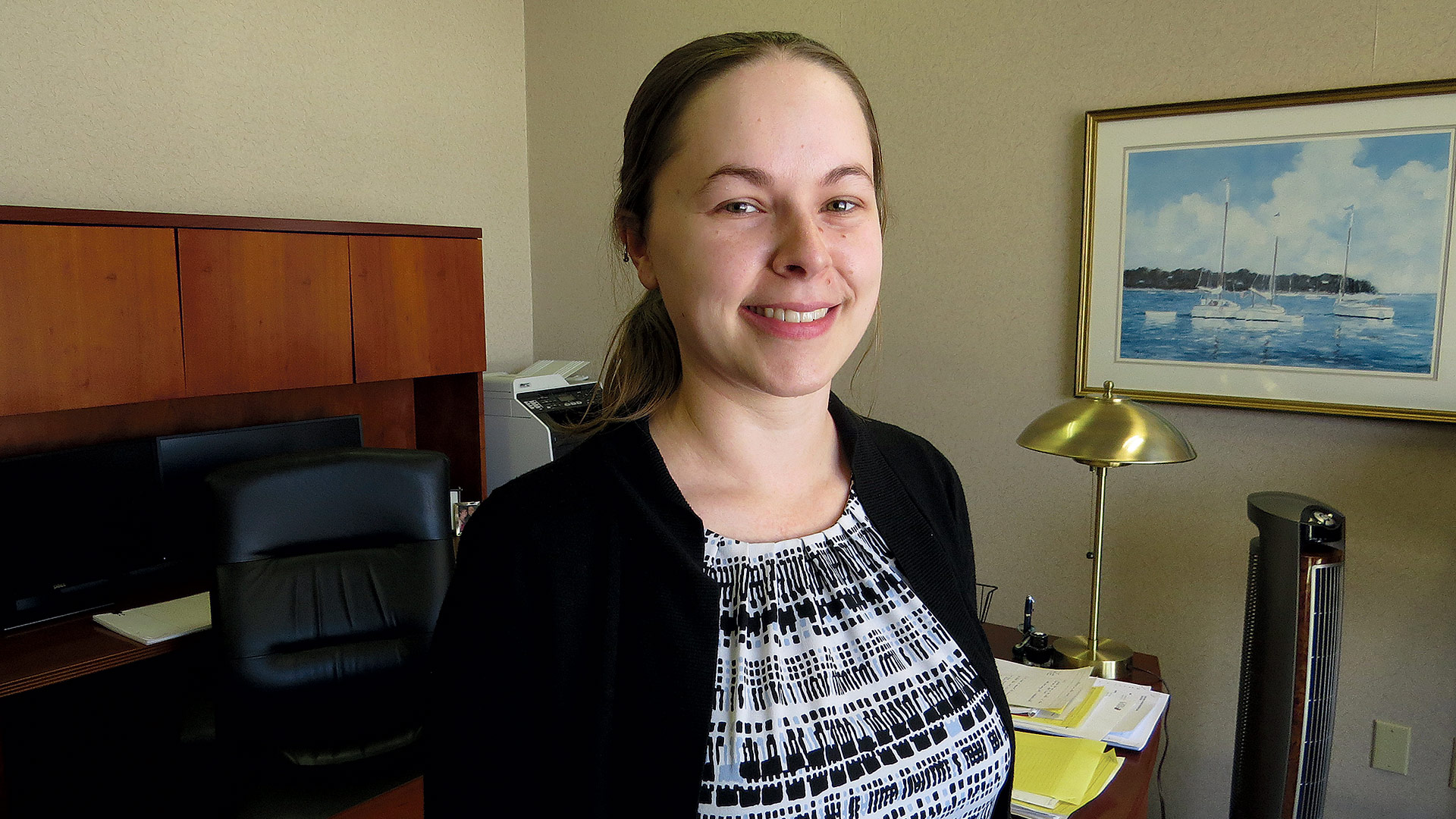
Alex Balise McEwen, fourth-generation member of the Balise leadership team, says the company will celebrate its centennial throughout the year and in many different ways.
This business has certainly come a long way since the Square Deal Garage, and there have been many individuals and milestones of note, she went on, and the company will use various methods to tell those stories — such as the back wall of the area of the service department at Balise Honda where customers would pick up their vehicles after the work was done. There, several photos and types of imagery have been placed that help tell the story of this particular dealership.
There’s a large photo of Milton Berman, founder of Yale Genton, the large clothing store that once stood on the property at the south end of Riverdale Street, as well as a photo of that store. But most of the others are related to the Honda brand and Jim Balise’s somewhat risky but ultimately rewarding decision to sell the small Japanese cars.
Indeed, there’s a window sticker for a 1971 Honda model; the price was $1,775. There’s also a photo taken in 1972 in Forest Park showing Jim Balise and several of his colleagues standing behind a both a two-cylinder Honda and an eight-cylinder Chevy Impala. And then, there’s a large color photo of the 1973 Honda Civic, the car that changed the fortunes of not only that carmaker, but maybe the Balise company itself, said the company’s historian.
“During the 1973 gas crisis, we had a Chevrolet getting eight miles per gallon, and we had the Chevy Vega, which was supposed to be the savior of the American car industry, and what happens — the engines start blowing up on them,” Bobby Balise recalled. “All we had left besides the Chevys in the showroom was this little Honda Civic, which got great gas mileage; I really believe that saved the franchise to have the foresight to have two car lines.”
There have been many other fortuitous gambles and hard decisions made over the past 100 years, and by each generation, said Jeb Balise, who particularly likes telling stories about his grandfather, who he described as his best friend growing up.
“During the 1973 gas crisis, we had a Chevrolet getting eight miles per gallon, and we had the Chevy Vega, which was supposed to be the savior of the American car industry, and what happens — the engines start blowing up on them. All we had left besides the Chevys in the showroom was this little Honda Civic, which got great gas mileage; I really believe that saved the franchise to have the foresight to have two car lines.”
Recently made part of the inaugural class of the Massachusetts State Automobile Dealers Association’s New Car Dealer Hall of Fame, Paul Balise was a very hands-on manager who spent his career doing what he was doing at the start — fixing things, said Jeb, as one of his favorite stories about his grandfather reveals.
“It was the mid-’70s, I had just started working for my father, and we needed an electrician for … something, I don’t remember what. So we got an electrician, and they did the repair,” he recalled. “A week or two later, my father comes down with the bill, which was reasonable, and says, ‘what are you doing? — your grandfather does all the repairs around here.’
“It wasn’t to save money,” he went on. “That’s what my grandfather did; at 80, he was still a mechanic slash repairman slash everything else.”
Overall, what he did was set a tone, not just with his work ethic but with his ability to visualize opportunities and seize them.
Driving Forces
Slicing through the long history of the company, both Jeb and Bobby Balise said the decision to move off Main Street and eventually buy the Williams Dodge property on Columbus Avenue was a watershed moment and one that in many ways set the tone for all that was to follow.
“Paul knew he had to move off Main Street because there wasn’t enough room for cars and storage, and he took a gamble and bought that building,” said Bobby, whose father worked alongside Paul for many years as parts manager. “He hesitated on it, and with good reason; it was the height of the Depression, and no one knew what was going to happen and how long it was going to last. But he did it, and proved out to be a spectacular location for him, which we still own today.”
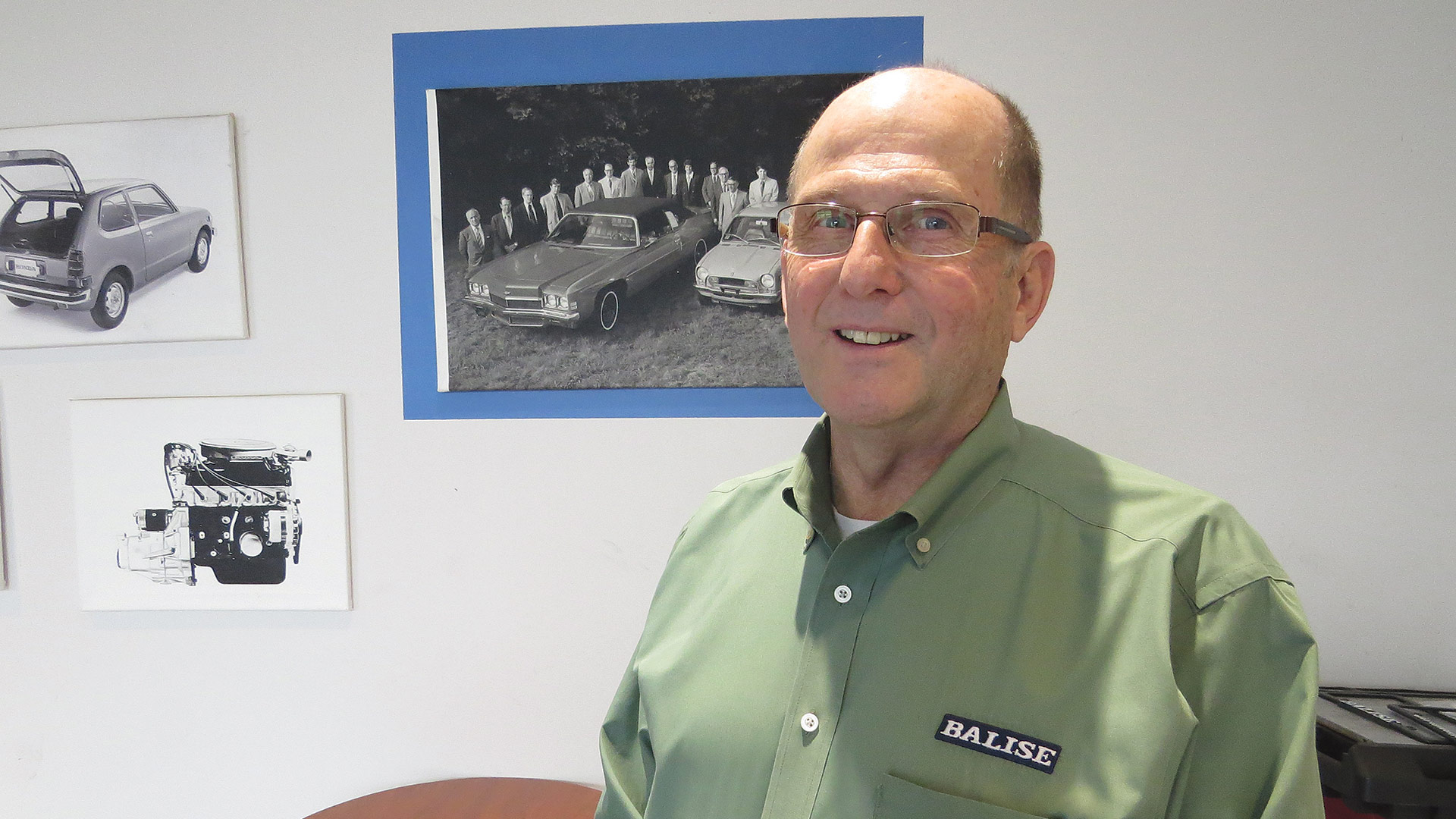
Bobby Balise is the Balise company’s unofficial historian, a role he’s carried out with great enthusiasm for almost a half-century.
Jeb agreed, and siad the deal might not have happened if his grandfather was left to his own instincts.
“The bank shows up and has a meeting with him and says, ‘Paul, we want to put you in this location,’” he said, recalling the stories told to him about a lease that would be for $600 a month. “My grandfather says he can’t afford it, and those at the bank say, ‘we’ll make sure you can afford it.’
“When the recession was over, the same bankers said, ‘Paul, we’re going to sell you the dealership — it’s time for you to buy it,’” he went on. “Again, he said, ‘I can’t afford it,’ and they basically said, ‘we’ll make it so you can afford it’; it was all on a handshake.”
Moving quickly through the past 40 years of the company’s history — the part less chronicled in those albums — the Balise name moved well beyond Springfield and Chevrolet, starting with that Honda franchise.
Today, the company has 21 new- and used-car dealerships in Western Mass., Rhode Island, and on Cape Cod, and a host of nameplates, foreign and domestic, including Chevy, Ford, Chrysler, Buick, GMC, Honda, Toyota, Nissan, Hyundai, Mazda, Kia, and many others.
And, as noted, it has diversified with collision-repair shops and car washes.
Diversification is necessary, he said, because Balise, with all the nameplates it sells, has more than adequate coverage in this region when it comes to sales. Opportunities for continued growth, therefore, lie more in other businesses related to the car.
But there are opportunities to add dealerships in other markets, including Rhode Island and Connecticut, he said, adding that the company is always looking for new opportunities.
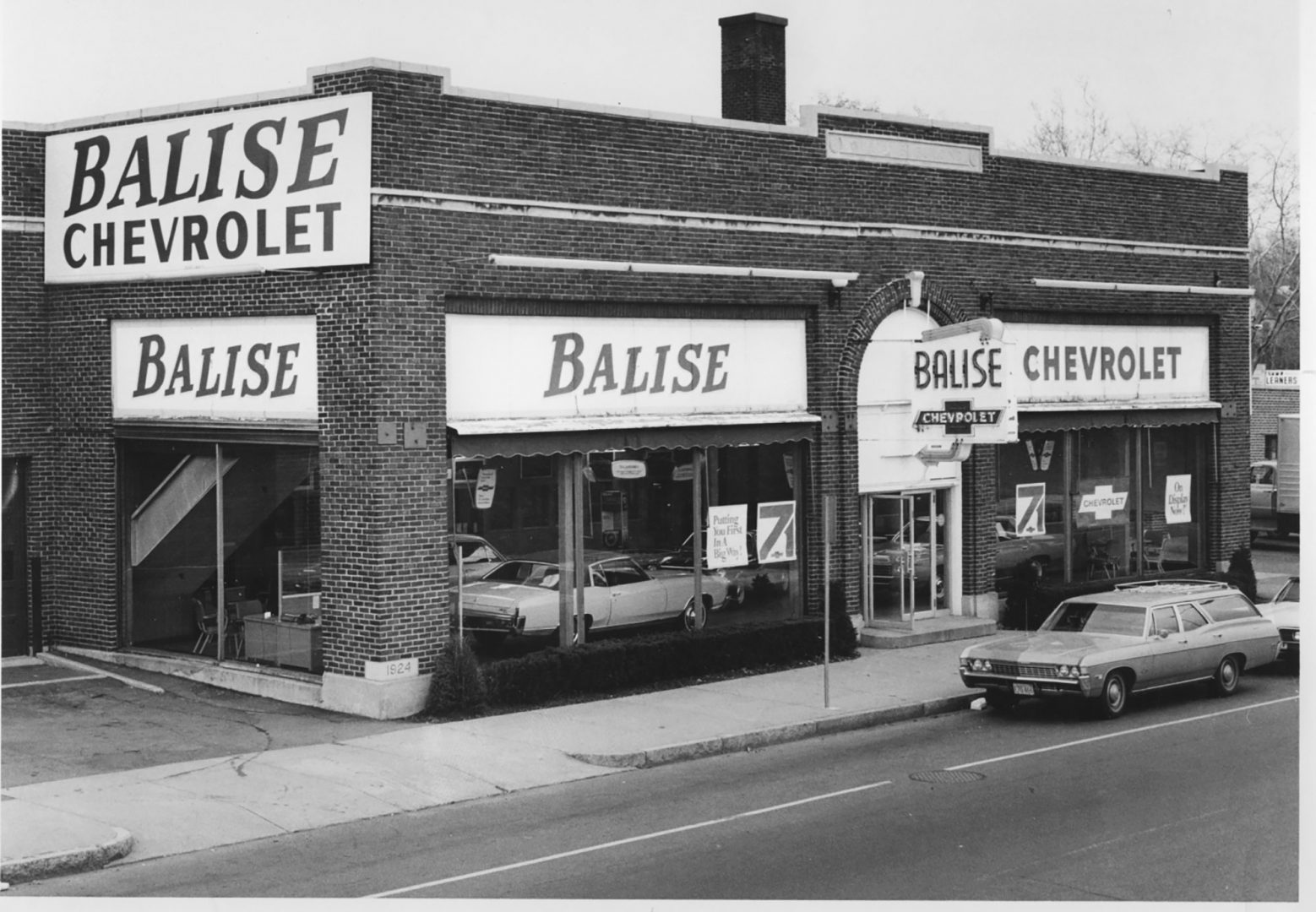
Paul Balise moved his Chevy dealership to Columbus Avenue at the height of the Great Depression, a risky move that set the tone for successive generations of company leadership.
As he carries on the work of the generations that came before him, Jeb Balise said he learned a lot from both his father and grandfather — about the car business, yes, but more about business in general.
“They taught me about how to treat people,” he explained. “They genuinely cared about doing the right thing and helping people. That sounds cliché and corny, but that’s how they were.”
Those thoughts stay with him today as he leads an auto group at a time of ongoing change and consolidation — a time when repair of vehicles is just as important a part of the business — and one with better margins — than new-car sales.
“The level of competition is actually greater because they’re bigger dealerships and the throughput per dealership is much higher, which really helps the consumer because it means you have better selection wherever you end up. Between the Internet and technology and the level of competition with other dealers, it’s never been easier to buy a car.”
In that respect, not much has changed in 100 years, he said with a laugh, adding that, in most all other ways, the landscape has changed considerably.
Especially with regard to consolidation. Indeed, while the days of the single-franchise dealer are not officially over, they are certainly numbered.
“Consolidation continues, and bigger auto groups are getting even bigger,” he explained. “And the level of competition is actually greater because they’re bigger dealerships and the throughput per dealership is much higher, which really helps the consumer because it means you have better selection wherever you end up. Between the Internet and technology and the level of competition with other dealers, it’s never been easier to buy a car.”
There’s still plenty of room for more consolidation, he went on, adding that single dealerships are being bought by groups, and groups are being bought up by bigger groups.
“There’s a lot of buy-sell activity still happening at this period of time, and it usually starts happening when the market gets a little tighter,” he went on. “It’s caused by a few things — retirement age, getting tired, not having kids in the business who want the business, and other factors.”
Balise will not be one of the companies bought up by a larger group because it has no intention of being an acquisition target, said Jeb, adding that he rarely if ever even gets an inquiring call, because those who might pick up the phone know there’s no point in doing so.
“The goal is that we keep it a generational and growing business,” he explained. “We pride ourselves on being a significant part of the communities we operate in, and making a difference — in the lives of our associates as well as the customers and the general community.”
Past Is Prologue
As he continued flipping through the photo albums, Bobby Balise stopped at a page with a curious but poignant collection of items.
One is a photo of the company’s first tow truck, or wrecker, as they were called in those days — a 1948 Weaver with a three-ton boom and a hand crank. It’s symbolic of how the company has always been about more than merely selling cars.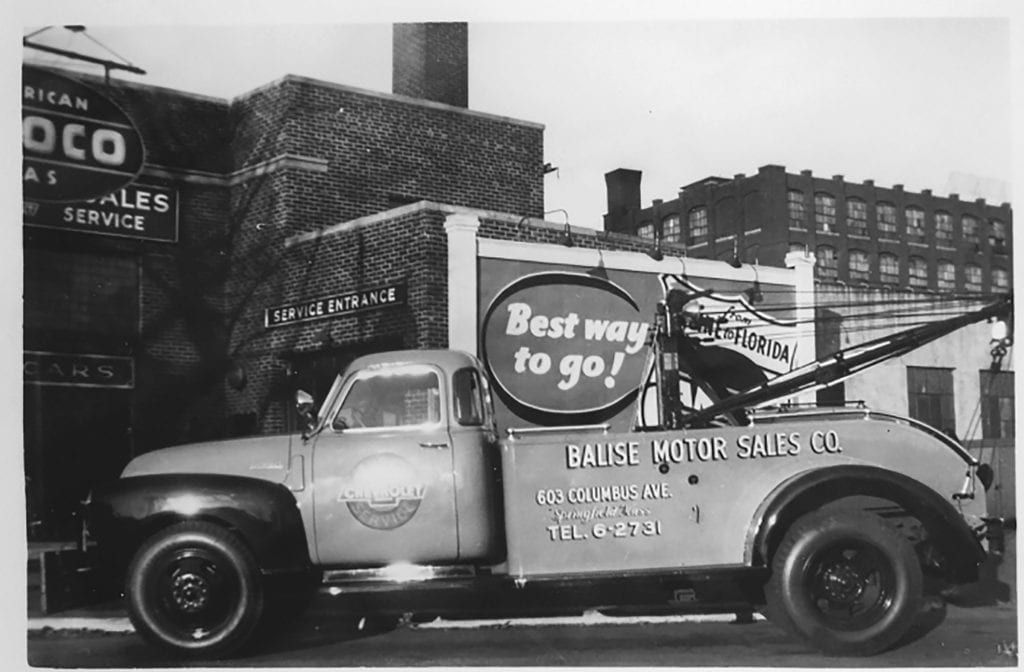
There’s also a photo of James Balise looking not into the camera, but toward what the caption describes as “the unknown future.”
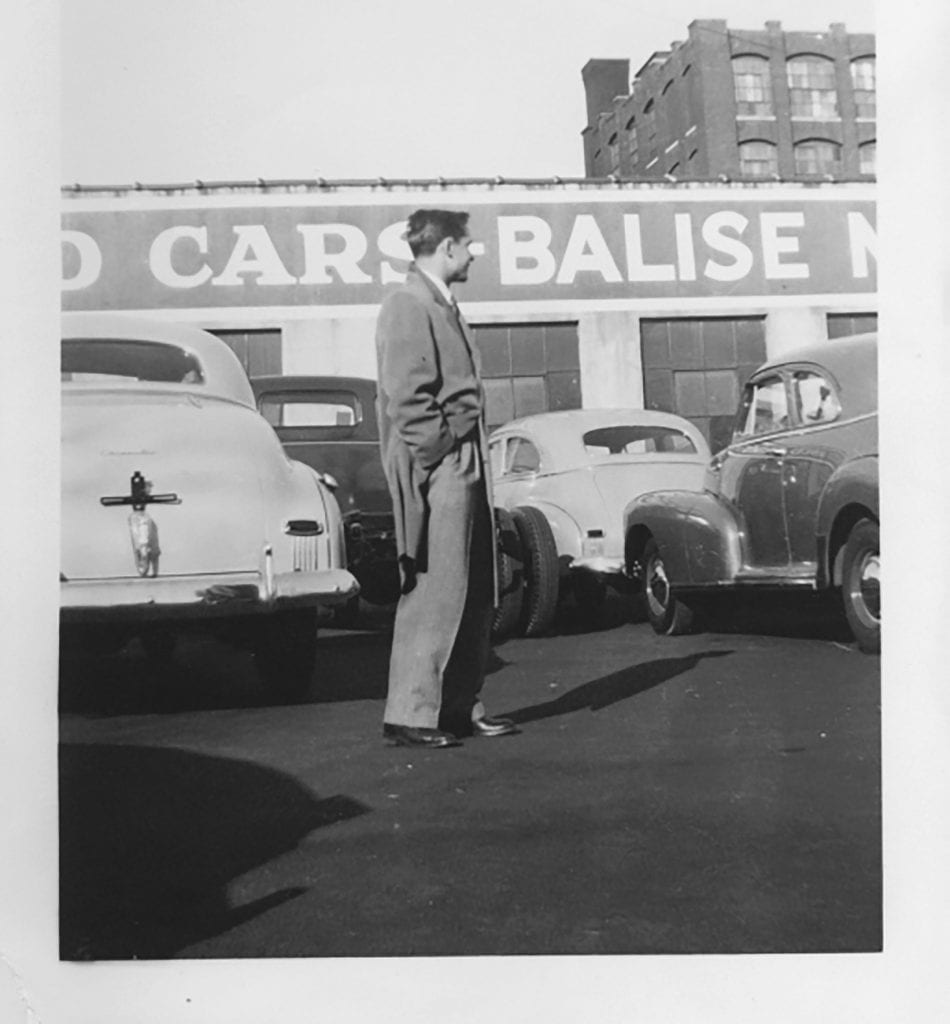
The caption under this photo from the company’s archives reads ‘James Balise looks into the unknown future — 1947.’
And then, there’s a recounting of what was said to Paul Balise by friend Bob Johnston as the two were playing a round with others on the recently opened Franconia Golf Club in Springfield and Paul was expressing considerable anxiety over his decision to buy the vacant auto dealership on Columbus Avenue.
“The clouds you so much dread are rich in mercies and shall break in blessings on your head,” Johnston supposedly said.
That’s a prescient thought and a harbinger for a company that has seen the sun shine on it over the years, but also has been able to make it rain — in all kinds of ways.
George O’Brien can be reached at [email protected]





